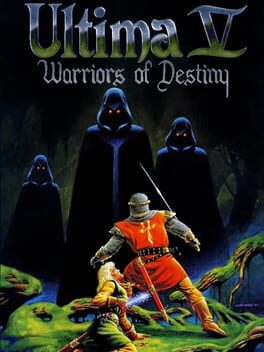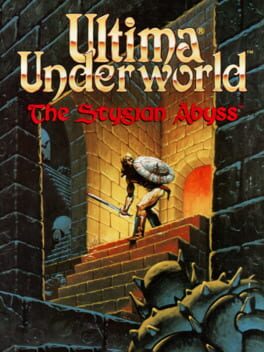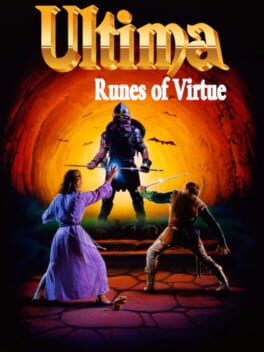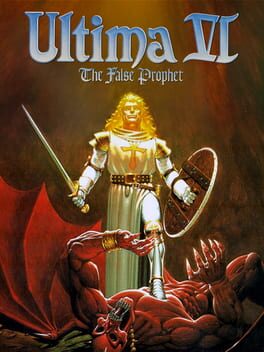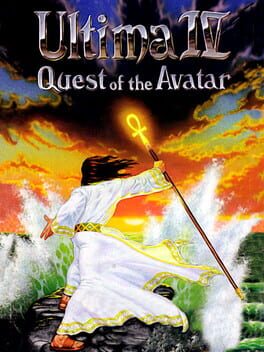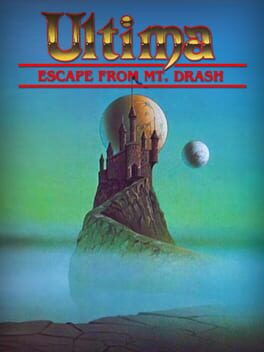

After a century of relative peace, the Avatar of Virtue is summoned back to the medieval kingdom of Britannia to deal with a new threat: the usurper Lord Blackthorn, a formerly honorable nobleman who has been corrupted by strange new creatures called the Shadowlords. After the recent disappearance of the true king, Lord British, the realm has fallen under martial law. Blackthorn now rules the land by brutally enforcing the eight Virtues upon the people of Britannia - corrupting their meaning in the process. The Avatar must gather together his former companions, now made outlaws by Blackthorn's regime, and venture forth to defeat the vile Shadowlords and recover the true king from the shadowy depths of the Underworld.
Also in series
Released on
Genres
Reviews View More
The culmination of the Ultima games in many ways, it carries over much of the gameplay from the previous title, but improves upon or expands where it can within the limitations of the aging engine. The most significant aspect of this is that the world just feels more lived in due to the larger number of towns, more stuff to talk about, the daily routines that NPCs follow along the day/night cycle feature and the impact of the Shadowlords showing up in town.
While Garriott was able to improve upon the social and interactive aspects of the game, I think the combat is still riddled with annoyances. The idea to only give one character experience is just flat out stupid, and then making it take forever to level up seems like an intentional waste of time especially when you now lose experience if you die.
All in all, I like the concept of the enemy always looming around the edges of your adventure. It invokes a very Tolkienesque sense of danger in the world, but my ongoing problem here is that I just don't like the world Garriott has created all that much. The premise of the world becoming bad because the bad guy took over really doesn't astonish me in the way it apparently blew some people away, and when you combined that with the tedious combat, I just get back to where I started with this series which is admiring its technical inventions, while shrugging my shoulders at Britannia.
While Garriott was able to improve upon the social and interactive aspects of the game, I think the combat is still riddled with annoyances. The idea to only give one character experience is just flat out stupid, and then making it take forever to level up seems like an intentional waste of time especially when you now lose experience if you die.
All in all, I like the concept of the enemy always looming around the edges of your adventure. It invokes a very Tolkienesque sense of danger in the world, but my ongoing problem here is that I just don't like the world Garriott has created all that much. The premise of the world becoming bad because the bad guy took over really doesn't astonish me in the way it apparently blew some people away, and when you combined that with the tedious combat, I just get back to where I started with this series which is admiring its technical inventions, while shrugging my shoulders at Britannia.
For me, Ultima V is defined by a tension between the exciting ambitions of its worldbuilding and the frustrations of its approach towards the traditional strictures of the CRPG.
Ultima V is fascinating, a game that subverts the groundbreaking moral structure of its predecessor by transforming its moral principles into tools of absolutist violence. Its vision of an oppressed Britannia is dark, bleak, and more immersive than ever before, thanks to an impressive-for-1988 devotion to world simulation (there's a day-night cycle! NPCs have their own schedules! you can sit in a chair!) and more fleshed-out writing in NPC conversations.
But my favorite thing about it is its progression. The conversation system is based around keywords and a text parser - a character may have a key piece of information on how to defeat the Shadowlords and free Britannia, but you won't know to ask them about it unless you've spoken to another character halfway across the world. With a journal in hand, this turns the game into an exercise in cross-continent detective work, requiring you to gather and follow-up on clues and leads as you travel from town to town and seek out every human settlement in Britannia. This is where the game shines, requiring you to explore and forcing you to sit with the world the development team has built and see the effects Lord Blackthorn's violent rule has had on the people of Britannia.
Unfortunately Ultima V also wants to be an RPG, and this is where it's at its weakest. I've never been a big fan of the combat in this era of Ultima, and it continues to be relatively slow and tedious here. Character progression takes a frustratingly long time - an unbelievable amount of XP is required to hit the max level of 8, and only the character who deals the killing blow to an enemy gets any XP from it. To top it off, magic kills give no XP whatsoever, cutting off a lot of the tactical usefulness of combat spells, and in classic CRPG fashion, dying down-levels you and removes a significant amount of XP. None of this was much of a problem until I hit the combat-heavy dungeons, most of which are required to get many of the items needed to finish the game. Even after a full 20 hours with a smaller party of 4 characters (out of a max of 8), my Avatar was only level 6, with most of the rest of my party at levels 4 or 5. Suffice to say, getting through the final dungeon was a struggle and I nearly gave up a handful of times.
It's been a decade since I played the first four Ultimas, but I don't remember the combat grating on me so much before. Some cursory reading on the internet confirms that a lot of these problems are unique to Ultima V - combat is harder here and plays a more central role, and it's a lot less forgiving when it comes to doling out XP. While it's in keeping with the game's bleak world and atmosphere, it's also a bummer, and takes away from the game's very real strengths.
Ultima V is fascinating, a game that subverts the groundbreaking moral structure of its predecessor by transforming its moral principles into tools of absolutist violence. Its vision of an oppressed Britannia is dark, bleak, and more immersive than ever before, thanks to an impressive-for-1988 devotion to world simulation (there's a day-night cycle! NPCs have their own schedules! you can sit in a chair!) and more fleshed-out writing in NPC conversations.
But my favorite thing about it is its progression. The conversation system is based around keywords and a text parser - a character may have a key piece of information on how to defeat the Shadowlords and free Britannia, but you won't know to ask them about it unless you've spoken to another character halfway across the world. With a journal in hand, this turns the game into an exercise in cross-continent detective work, requiring you to gather and follow-up on clues and leads as you travel from town to town and seek out every human settlement in Britannia. This is where the game shines, requiring you to explore and forcing you to sit with the world the development team has built and see the effects Lord Blackthorn's violent rule has had on the people of Britannia.
Unfortunately Ultima V also wants to be an RPG, and this is where it's at its weakest. I've never been a big fan of the combat in this era of Ultima, and it continues to be relatively slow and tedious here. Character progression takes a frustratingly long time - an unbelievable amount of XP is required to hit the max level of 8, and only the character who deals the killing blow to an enemy gets any XP from it. To top it off, magic kills give no XP whatsoever, cutting off a lot of the tactical usefulness of combat spells, and in classic CRPG fashion, dying down-levels you and removes a significant amount of XP. None of this was much of a problem until I hit the combat-heavy dungeons, most of which are required to get many of the items needed to finish the game. Even after a full 20 hours with a smaller party of 4 characters (out of a max of 8), my Avatar was only level 6, with most of the rest of my party at levels 4 or 5. Suffice to say, getting through the final dungeon was a struggle and I nearly gave up a handful of times.
It's been a decade since I played the first four Ultimas, but I don't remember the combat grating on me so much before. Some cursory reading on the internet confirms that a lot of these problems are unique to Ultima V - combat is harder here and plays a more central role, and it's a lot less forgiving when it comes to doling out XP. While it's in keeping with the game's bleak world and atmosphere, it's also a bummer, and takes away from the game's very real strengths.
This is one of the most subversive and immersive roleplaying experiences I've ever played. It takes everything the fourth game did and forces you to question what you were trying to do in that game and whether or not you did the right thing. For a game that came out in 1988, this must have been truly miraculous. Games in a way are still trying to catch up to this. Read the manuals and be immersed in one of the most challenging and rewarding gaming experiences you're likely to have.
I would say that Ultima V was "ahead of its time", but the sad reality is that there are still hardly any games that can measure up to its qualities: a rich, living game world, where every single NPC has its own daily routine and can be engaged in naturally flowing conversations; the ability to interact with almost every object in the environment; completely open, non-linear progression instead of a "main quest line"; a deep, thought-provoking story that is still relevant today; and I'm not even talking about crazy things like the simulation of wind, moon cycles and planetal orbits. How they managed to do all this on an Apple II in 1988 is a goddamn miracle to me. Over 30 years later, Ultima V is still the most ambitious and perhaps the greatest CRPG of all time.
Uma sequência digna de Ultima IV, concentrando-se em subverter e questionar o sistema moral que o antecessor tão laboriosamente construiu e melhorando várias de suas mecânicas (especialmente o combate). Quando ele se foca na exploração e intereção com personagens, o game realmente brilha. Pena que nos momentos finais, quando você tem que entrar nas dungeons, acaba ficando extremamente maçante, com labirintos insanos e grinding quase obrigatório para sobreviver alguns desafios.
